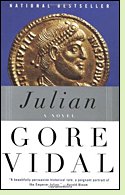Julian
by Gore Vidal
Reviewed by David Maclaine

The New York Times obituary of Gore Vidal suggested that Julian might be his best novel. It is at the least a very fine one, providing an astute view of the Roman Empire some decades after Christianity displaced the worship of the old gods, and portraying one emperor's attempt to turn back the clock. The narrator - until a brief postlude - is known today as “Julian the Apostate” because of his decision to reject the new faith and return to the old. Vidal was vocal about his belief that the Western world went astray by adopting religions based on a sky god who insisted on being the one and only deity, and his well-researched description of the Christian Church in its early years is not flattering. The Arian faction then in the ascendant is opposed by the rival sect that would eventually displace it by methods that included full-fledged terrorism. Who can blame Julian for wanting to return to the days when a multitude of religions coexisted in relative peace? How could a man steeped in classical wisdom countenance a fanatical faith that made the streets run red with blood over the question of exactly how distinct the Father might be from his Holy Son?
Julian’s bold attempt to bring back the old gods is doomed - their flame had gone cold, never to be rekindled - but the novel Julian is a triumph. No writer surpasses Vidal at tackling the crucial conflict between the imperatives of a monotheistic faith and the reason-based toleration produced by civilization at its best. When the emperor marches off to the eastern frontier in yet another effort to put those pesky Persians in their place, those of us who know how such campaigns tended to end will feel a tinge of regret. We know good intentions will fail again, and the glory of the classical world will ebb away on the sands with the life of its last champion. (1964, 528 pages)
More about Julian at Powell's Books or Amazon.comJulian appears on the list of The 50 Best Historical Novels for a Survey of Ancient Roman History
The Philosopher Prince by Paul Waters (2010), about two young Romans charged with treason whose only hope is help from Prince Julian, who is himself hated by his uncle, Emperor Constantine II; #3 in a series. More info
Gods and Legions by Michael Curtis Ford (2002), about Julian's wars. More info
Imperial Renegade by Louis de Wohl (1950), about Julian's attempt to revive paganism. More info
Nonfiction about Julian:
The Last Pagan: Julian the Apostate and the Death of the Ancient World by Adrian Murdoch (2004). More info
Julian the Apostate by G.W. Bowersock (1978). More info
Julian's Gods: Religion and Philosophy in the Thought and Action of Julian the Apostate by Rowland B.E. Smith (1995). More info
Online:
Julian the Apostate at Wikipedia
Back to Historical Novels: Ancient
Back to Directory of Book Reviews